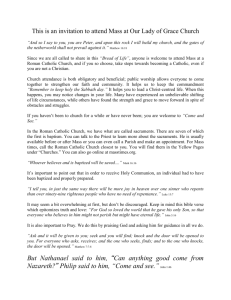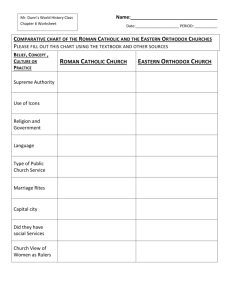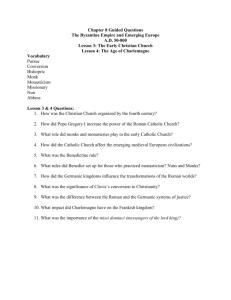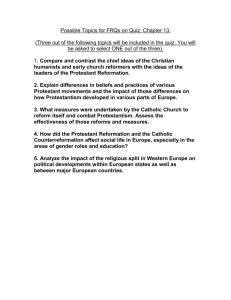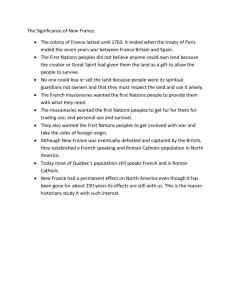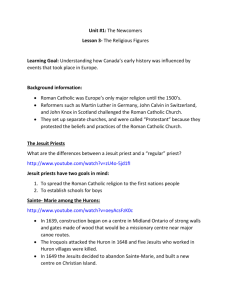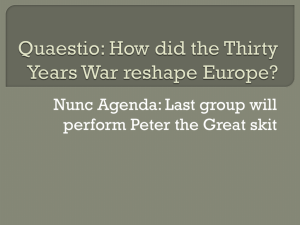Josiah Strong: Our Country - W W W . M R D O W D . W E E B L Y
advertisement
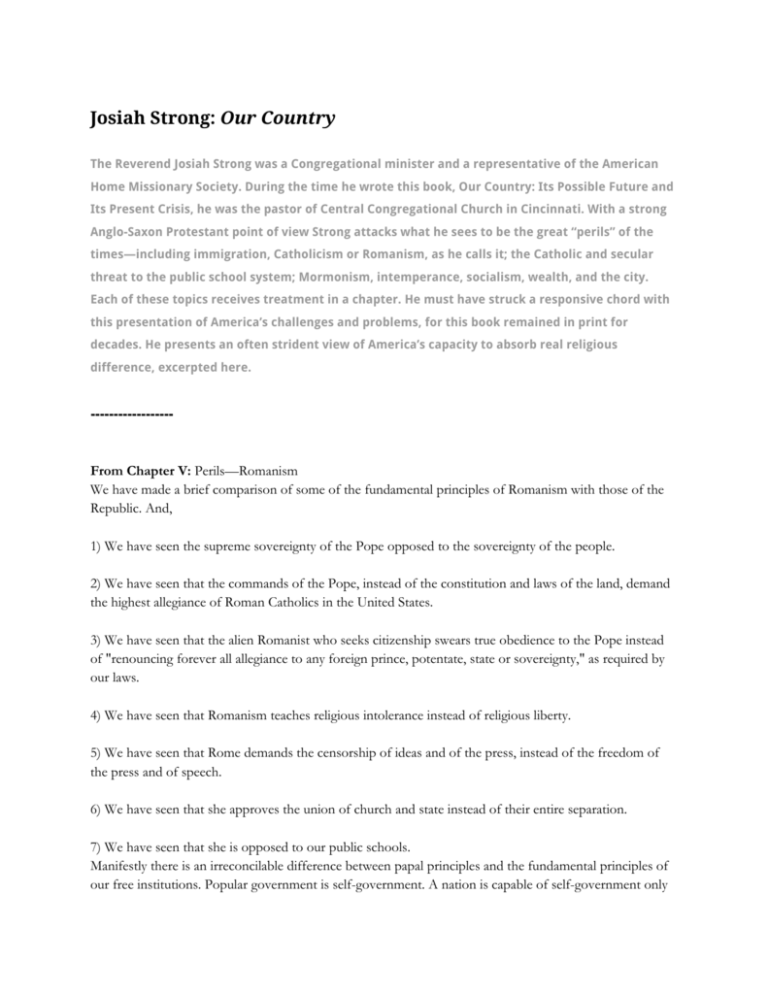
Josiah Strong: Our Country The Reverend Josiah Strong was a Congregational minister and a representative of the American Home Missionary Society. During the time he wrote this book, Our Country: Its Possible Future and Its Present Crisis, he was the pastor of Central Congregational Church in Cincinnati. With a strong Anglo-Saxon Protestant point of view Strong attacks what he sees to be the great “perils” of the times—including immigration, Catholicism or Romanism, as he calls it; the Catholic and secular threat to the public school system; Mormonism, intemperance, socialism, wealth, and the city. Each of these topics receives treatment in a chapter. He must have struck a responsive chord with this presentation of America’s challenges and problems, for this book remained in print for decades. He presents an often strident view of America’s capacity to absorb real religious difference, excerpted here. ­­­­­­­­­­­­­­­­­­ From Chapter V: Perils—Romanism We have made a brief comparison of some of the fundamental principles of Romanism with those of the Republic. And, 1) We have seen the supreme sovereignty of the Pope opposed to the sovereignty of the people. 2) We have seen that the commands of the Pope, instead of the constitution and laws of the land, demand the highest allegiance of Roman Catholics in the United States. 3) We have seen that the alien Romanist who seeks citizenship swears true obedience to the Pope instead of "renouncing forever all allegiance to any foreign prince, potentate, state or sovereignty," as required by our laws. 4) We have seen that Romanism teaches religious intolerance instead of religious liberty. 5) We have seen that Rome demands the censorship of ideas and of the press, instead of the freedom of the press and of speech. 6) We have seen that she approves the union of church and state instead of their entire separation. 7) We have seen that she is opposed to our public schools. Manifestly there is an irreconcilable difference between papal principles and the fundamental principles of our free institutions. Popular government is self-government. A nation is capable of self-government only so far as the individuals who compose it are capable of self-government. To place one's conscience, therefore, in the keeping of another, and to disavow all personal responsibility in obeying the dictation of another, is as far as possible from self-government, and, therefore, wholly inconsistent with republican institutions, and, if sufficiently common, dangerous to their stability. It is the theory of absolutism in the state, that man exists for the state. It is the theory of absolutism in the church that man exists for the church. But in republican and Protestant America it is believed that church and state exist for the people and are to be administered by them. Our fundamental ideas of society, therefore, are as radically opposed to Vaticanism as to imperialism, and it is as inconsistent with our liberties for Americans to yield allegiance to the Pope as to the Czar. From Chapter VI : Perils—Religion and the Public Schools Democracy necessitates the public school. Important as is the school to any civilized people, it is exceptionally so to us, for in the United States the common school has a function which is peculiar, viz., to Americanize the children of immigrants. The public school is the principal digestive organ of the body politic. By means of it the children of strange and dissimilar races which come to us are, in one generation, assimilated and made Americans. It is the heterogeneous character of our population (especially in cities) which threatens the integrity of our public school system and at the same time renders it supremely important to maintain that integrity. Moreover, apart from consequences to the school system, the policy which is finally adopted by the American people touching religion and the public schools concerns most intimately the welfare both of our youth and of the State. . . .Two theories that threaten the well-being of the schools and of the State demand our attention. First, that of the Roman Catholic hierarchy, which holds that education should be distinctly religious, which of course means Roman Catholic. Vague or general instruction will not suffice, there must be inculcated the system of doctrine found in the Roman catechism. It holds that religious and secular education cannot be safely separated. Inasmuch, therefore, as the State will not teach Roman Catholic doctrine in the public schools, parochial schools become necessary. It is held that the public schools are in fact Protestant, and that Catholics are taxed to support them while they carry the burden of their own parochial schools. They complain that this is an injustice which can be removed only by the division of the school fund, and that to divide this fund between the “Protestant” and Catholic schools pro rata would be only equitable. . . . This cleavage of the population along religious lines is greatly to be regretted. It is un-American. It carries the shadow on the dial of progress back from the nineteenth to the seventeenth century. Intercourse tends to eliminate differences and to make a population homogeneous. Non-intercourse nourishes suspicion, prejudice, and religious bitterness, of which the world has had quite enough already. There are many reasons why children of different religions and different races, of rich and poor, of all classes of society, should mingle in the public school. This segregation of the Catholic children, though well intended, inflicts injury upon society and a greater injury upon the Catholic children themselves. How can the evil results which must necessarily attend the establishment of parochial schools be minimized? Certainly not by secularizing the public schools. This remedy was tried to a considerable extent, when the question of the Bible in the public schools was so widely discussed some twenty years ago. Instead of conciliating the Catholic priesthood, it only put into their mouth the cry which they are using today, with the greatest effect upon their own people, viz., that the public schools are “godless.” ...The second theory touching religion and the public schools which demands our attention is that of the secularists, among whom are counted many Christian men as well as all Jews and agnostics. According to this theory the province of the State is wholly secular; its true attitude is that of absolute neutrality toward all forms of religious belief and unbelief; to teach religion in any form is to do violence to the rights of certain classes of citizens. ...When the fathers added to the Constitution the principle of strict separation of Church and State, they did not intend to divorce the State from all religion. Says Judge Story, speaking of the time when the Constitution was adopted, “The attempt to level all religions, and make it a matter of State policy to hold all in utter indifference, would have created universal disapprobation, if not universal indignation.” The principle of the separation of Church and State undoubtedly forbids sectarian instruction in the State schools; but we have the highest legal and judicial authority for saying that it does not forbid undenominational religious teaching. “But,” it will be asked, “does not the teaching of religious doctrine which is undenominational violate the rights of agnostics quite as much as inculcating the dogmas of one sect wrongs the adherents of others?” By no means; because the teaching of the three great fundamental doctrines which are common to all monotheistic religions is essential to the perpetuity of free institutions, while the inculcation of sectarian dogmas is not. These three doctrines are that of the existence of God, the immortality of man, and man's accountability. These doctrines are held in common by all Protestants, Catholics, and Jews. There are comparatively few in this country who do not hold them; and the children of these few should be taught these fundamental truths of religion, not because agnostics are in the minority, for questions of conscience can be settled neither by majorities nor by authority, but because the necessities of the State are above individual rights. [From Rev. Josiah Strong, Our Country: Its Possible Future and Its Present Crisis . (New York: The Baker and Taylor Co., 1891), 76-7, 92-6.]
